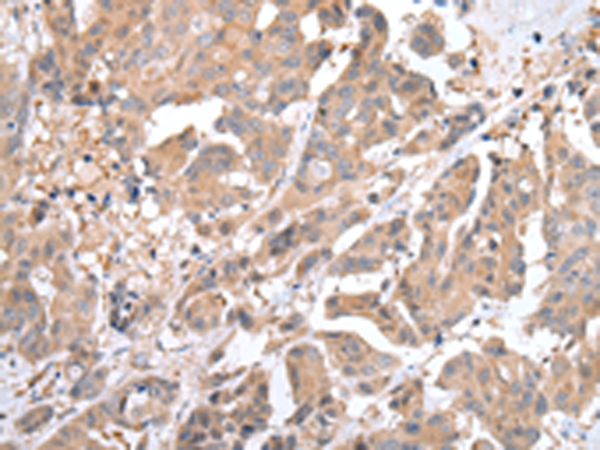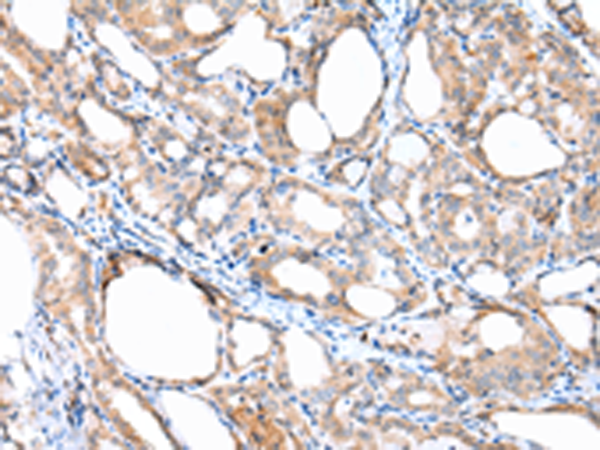


| WB | 咨询技术 | Human,Mouse,Rat |
| IF | 咨询技术 | Human,Mouse,Rat |
| IHC | 1/30-1/150 | Human,Mouse,Rat |
| ICC | 技术咨询 | Human,Mouse,Rat |
| FCM | 咨询技术 | Human,Mouse,Rat |
| Elisa | 1/1000-1/2000 | Human,Mouse,Rat |
| Aliases | HHT; ALK1; HHT2; ORW2; SKR3; ALK-1; TSR-I; ACVRLK1 |
| WB Predicted band size | 56 kDa |
| Host/Isotype | Rabbit IgG |
| Antibody Type | Primary antibody |
| Storage | Store at 4°C short term. Aliquot and store at -20°C long term. Avoid freeze/thaw cycles. |
| Species Reactivity | Human |
| Immunogen | Synthetic peptide of human ACVRL1 |
| Formulation | Purified antibody in PBS with 0.05% sodium azide and 50% glycerol. |
+ +
以下是关于ACVRL1抗体的3篇参考文献及其简要摘要:
1. **"ACVRL1 mutations in hereditary hemorrhagic telangiectasia patients"**
- 作者:Johnson DW等
- 摘要:研究分析了HHT患者中ACVRL1基因的突变类型,通过免疫组化和Western blot验证ACVRL1抗体在患者内皮细胞中的表达缺失,揭示了突变与血管畸形表型的关联。
2. **"ALK1 signaling and angiogenesis: Insights from ACVRL1 knockout models"**
- 作者:Sørensen I等
- 摘要:利用ACVRL1抗体在小鼠模型中检测ALK1蛋白的分布,发现其在内皮细胞中的特异性表达,并证明ALK1缺失导致血管生成异常,为靶向治疗提供依据。
3. **"Validation of a novel ACVRL1 monoclonal antibody for diagnostic applications"**
- 作者:Chen H等
- 摘要:报道了一种高特异性ACVRL1单克隆抗体的开发,通过免疫荧光和流式细胞术验证其在HHT临床诊断中的应用潜力,提高了突变蛋白检测的灵敏度。
如需更多文献,可进一步限定研究领域或年份。
ACVRL1 (Activin Receptor-Like Kinase 1), also known as ALK1. is a transmembrane serine/threonine kinase receptor belonging to the TGF-β (transforming growth factor-beta) superfamily. It primarily binds ligands such as BMP9 (bone morphogenetic protein 9) and BMP10. playing a critical role in angiogenesis, vascular development, and maintaining endothelial cell homeostasis. Mutations in the ACVRL1 gene are linked to hereditary hemorrhagic telangiectasia (HHT) type 2. a genetic disorder characterized by abnormal blood vessel formation and recurrent bleeding.
ACVRL1 antibodies are immunological tools designed to detect and study the expression, localization, and function of the ACVRL1 protein in research and diagnostic contexts. These antibodies are widely used in techniques like Western blotting, immunohistochemistry (IHC), and immunofluorescence (IF) to investigate vascular biology, tumor angiogenesis, and HHT-related mechanisms. They help researchers understand ACVRL1's signaling pathways, including its interaction with BMP ligands and downstream Smad proteins, as well as its crosstalk with other receptors like endoglin. Commercial ACVRL1 antibodies are typically validated for specificity in human, mouse, or rat samples, aiding in both basic research and preclinical studies targeting vascular diseases or anti-angiogenic therapies.
×